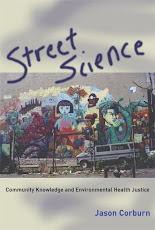Thursday, March 3, 2011
Wednesday, March 2, 2011
Berkeley's Nairobi Slum Upgrading Project & UN-HABITAT
Professor Jason Corburn is delighted to report that he and partners from his collaborative slum upgrading project in Nairobi, focused on the Mathare Valley informal settlement, were invited to present at the 23rd Session of the Governing Council of UN-HABITAT, in April 2011. Our partner organizations include the University of Nairobi, Slum/Shack Dwellers International, Muungano Support Trust (MUST) and Pamoja Trust. Jason Corburn's project at UC Berkeley was also invited to join The Habitat Partner University Initiative, which aims to promote the cooperation between UN-HABITAT and institutions of higher education, to facilitate exchange and cooperation between and among universities in developing and developed countries, to link UN-HABITAT’s approach on sustainable urbanization with university curricula and to bridge the gap between theory and practice by strengthening knowledge management, training for practitioners, providing policy advise and by preparing students for the needs of cities.
Cities & Environmental Health Regulations
Moving toward more healthy cities will require better enforcement of exiting environmental laws and new environmental health regulations tailored to protect a city's most vulnerable populations. A recent decision by the US Supreme Court refusing to hear New York City's case for why they want to regulate fuel emissions from taxis sets a dangerous precedent that may limit local governments' ability to set health-protective rules. The Court refused to hear the City's case for why local jurisdictions should be able to regulate automobile emissions by stating, in-part, that the setting of ambient air pollution and vehicle emissions standards is the responsibility of the Environmental Protection Agency under the Clean Air Act (CAA). Yet, since the 1970 Clean Air Act, local governments, particularly California, have been allowed to set their own, more strict air pollution regulations because of their "compelling and extraordinary" circumstances related to unhealthy air. The Obama Administration recently reiterated their support for California's more-strict air pollution rules in an executive order. California has also been allowed to move forward, ahead of the EPA and Congress, with climate change related regulation. In short, the Supreme Court's refusal to hear New York City's case for clean vehicle taxis is a major step backwards for allowing local governments to innovate and set health-protective regulations and comes, not surprisingly, as republicans unfairly attack the EPA. To help show the importance of the CAA, EPA and local air regulations, the EPA released a new study highlighting that the benefits far exceed the costs of clean air regulations (see example in table below). Now is not the time to scale back or limit government regulations that can improve urban health and benefit the economy.
Subscribe to:
Comments (Atom)







